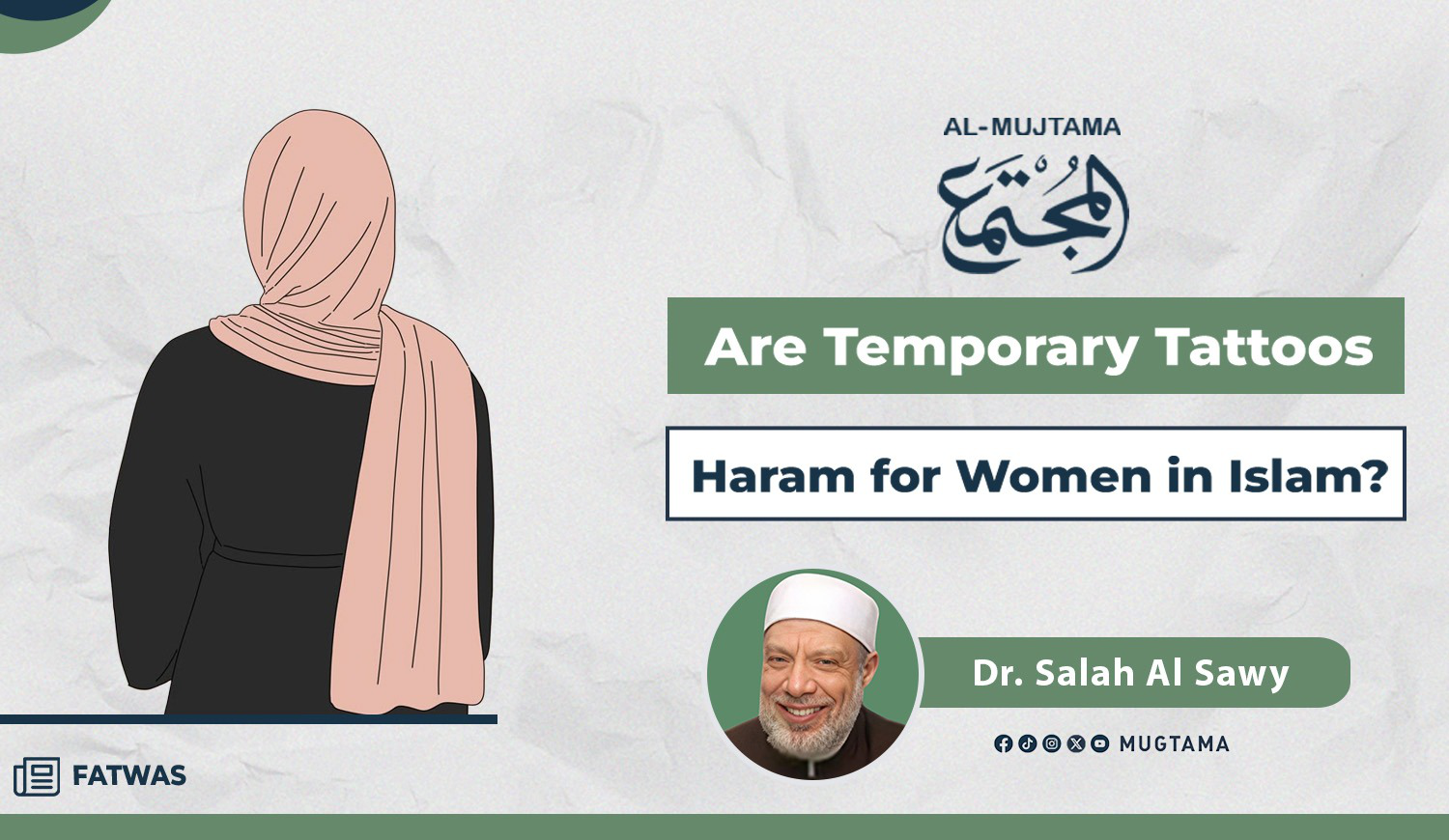Are Temporary Tattoos Haram for Women in Islam?

Question
Can a woman adorn herself
with temporary tattoos that do not leave permanent traces and can be removed
whenever she wishes?
Islamic Ruling on Permanent Tattoos
In the Name of Allah, the
Most Merciful, the Most Compassionate.
Praise be to Allah, and peace and blessings be upon the Messenger of Allah, his
family, companions, and all those who follow him. To proceed:
The prohibited tattoo, for
which the texts have warned against and cursed the one who does it, is the
permanent tattoo. It is done by piercing the body with needles until blood
flows, then filling the pierced area with kohl or other substances so that the
skin acquires another color, such as green or similar. This also applies to
modern cosmetic techniques that produce the same effect and permanence.
Tattoos have been used for
beauty purposes, and sometimes linked to superstitions and false charms. For
example, the ancient Egyptians believed tattoos could cure diseases and ward
off the evil eye.
The prohibition of tattoos in
this sense is unanimously agreed upon by scholars. Clear and authentic texts
have been narrated, including:
Abdullah Ibn Mas`ud (may
Allah be pleased with him) reported that Allah had cursed
those women who tattooed and who have themselves tattooed, those who pluck hair
from their faces and those who make spaces between their teeth for
beautification changing what God has created. This news reached a woman of the
tribe of Asad who was called Umm Ya'qub and she used to recite the Holy Qur'an. She came to him and said: What is this news that has
reached me from you that you curse those women who tattooed and those women who
have themselves tattooed, the women who pluck hair from their faces and who
make spaces between their teeth for beautification changing what God has
created? Thereupon Abdullah said: Should I not curse one upon whom Allah's
Messenger (peace be upon him) has invoked curse and that is in the Book also.
Thereupon that woman said: I read the Qur'an from cover to cover, but I did not
find that in it. whereupon he said: If you had read (thoroughly) you would have
definitely found this in that (as) Allah, the Exalted and Glorious, has said: “What
Allah's Messenger brings for you accept that and what he has forbidden you,
refrain from that.” That woman said: I find this thing in your wife even now.
Thereupon he said: Go and see her. She reported: I went to the wife of Abdullah
but found nothing of this sort in her. She came back to him and said: I have
not seen anything. whereupon he said: Had there been anything like it in her, I
would have never slept with her in the bed. (Sahih Al-Bukhari and
Muslim)
“I would have never slept with her
in the bed,” means we would
not have accompanied her or stayed with her, rather we would have divorced her
and parted ways. This was also mentioned by Imam Al-Nawawi.
Al-Nawawi (may Allah have
mercy on him) explained: “The woman who tattoos is the one who pierces the skin
with a needle or similar tool on the back of the hand, wrist, lip, or other
body parts until blood flows. Then she fills that area with kohl or another
substance so it turns green. Sometimes this is done in circles or patterns,
whether small or large. The doer is called washimah, and the one done
upon is mawshumah. If she requests it, she is mustawshimah. This
is prohibited for the doer, the receiver, and the requester. If it is done on a
little girl, the sin is upon the one who does it, not the girl herself, since
she is not accountable at that time.
Our scholars said: the
tattooed area becomes impure. If it can be removed by treatment, it must be
removed. If removal requires cutting then it must be removed, unless it would
likely cause harm, loss of limb, or disfigurement, then it is not required. In
such a case, if seen, there is no sin after repentance. But if removal is
possible without serious harm, it must be done, and delaying it is sinful. This
applies to both men and women alike. And Allah Knows best.”
Ibn Hajar also said: “The
tattoo is piercing the skin with a needle and filling it with kohl or another
substance, so the place becomes green.”
Ruling on Temporary Body Decorations
As for temporary designs, whether
with henna or other substances that leave only a temporary color and fade with
time, this is not included in the prohibition of tattoos. In fact, the Sunnah encouraged
women to beautify themselves
with henna and recommended it. The only exception is when such drawings depict
images of living beings, then it is prohibited but from that angle of tattooing
itself.
Conditions for Permissibility of Temporary Tattoos
In summary, temporary
decorations are allowed under the following conditions:
1.
The design must be temporary, disappearing naturally or removable,
without permanence.
2.
The designs must not include symbols of distorted religions, corrupt
beliefs, or deviant ideologies.
3.
They must not depict living beings.
4.
Such adornment must not be displayed to non-mahram men if applied on
private areas of adornment.
5.
The dyes and materials used must not harm the skin.
6.
They must not imitate immoral or disbelieving women.
7.
They must not be applied on private areas if another woman will be
applying them.
If these conditions are met,
then such adornment is permissible and falls under the category of allowed
decorations, not the forbidden permanent tattoo.
Imam Al-San`ani (may Allah
have mercy on him) said: “Tattoos have been described in some hadiths as
changing the creation of Allah. But henna and similar forms of dye are not
included in this. And even if they were, they are excluded by consensus,
because such practices existed during the time of the Prophet (peace be upon
him), and he even commanded women to dye their fingers with henna.”
Imam Al-Shawkani said: “This
prohibition applies only to changes that are permanent. As for what is not
permanent, such as kohl or other dyes, it is permissible, as was said by Imam
Malik and others.”
And Allah knows best.
You May Also Read:
- Women's Issues in Islamic Fatwas
- Is Hijab a Symbol of Empowerment or Oppression?
- 8 Stations in the Virtue of Chastity
-------------------------------------------------------------
Taken from fatawaalsawy.com












